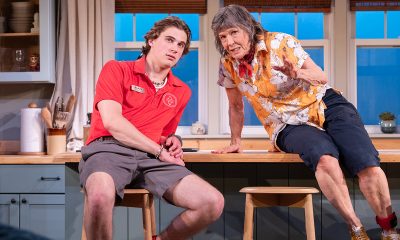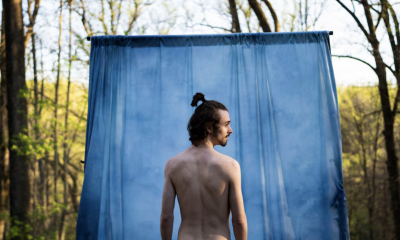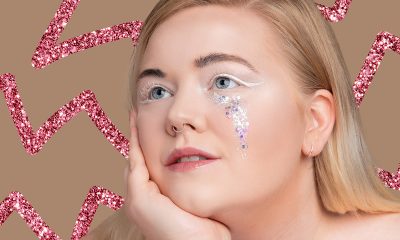Arts & Entertainment
Opera siren
Lesbian soprano Patricia Racette on ‘Tosca,’ being out and her life off the stage
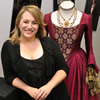
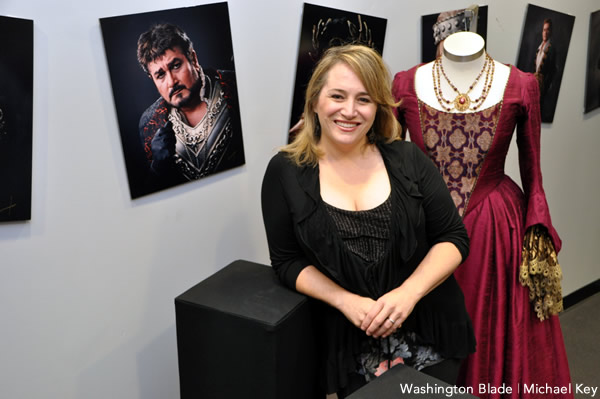
‘Tosca’ lead Patricia Racette at Washington National Opera’s rehearsal space in a Takoma Park warehouse. (Washington Blade photo by Michael Key)
Hardcore opera fans may quibble at the repetition, but hang around D.C. long enough and there’s a chance to see just about any standard-canon opera you can think of. Washington National Opera, now not-so-strange bedfellows with the Kennedy Center, kicked off its fall season last weekend with the Puccini warhorse “Tosca” with lesbian Patricia Racette in the title role.
Racette, who lives with her partner (mezzo soprano Beth Clayton) in Santa Fe, is hunkered down for the day at the Opera’s mammoth rehearsal/storage space in Takoma Park a few Mondays ago. Though dressed casually, she’s made up and coiffed as some of her afternoon press rounds are on camera.
Down several long hallways and through a giant costume room that looks like it could dress the entire cast of “Ben-Hur” and then some, Racette settles into a small and dingy library where CDs, VHS tapes and songbooks line the walls. During a 45-minute conversation, she riffs on her life off stage, the logistics of making it through live performance and why the stage, as opposed to the studio, is where she feels most alive musically.
Together for more than a decade and married since 2005, Racette says she and Clayton find a way to make their marriage work despite two busy careers that by necessity involve significant travel. Once several years ago they didn’t see each other for almost seven weeks.
“It was absolute torture,” Racette says. “Torture.”
Racette is developing a following in Washington. She was here in May for “Iphigenie en Tauride” (Gluck) after previous appearances in 2007 for “Jenufa” and 2009 as Ellen in “Peter Grimes,” all with WNO.
Though it half-heartedly reviewed the production, the Post called Racette’s “Tosca” performance “luminous” and “compelling” and praised her stamina and vocal authority in “Iphigenie.”
Racette calls singing opera akin to surfing.
“I mean it’s a fine art and it’s called a fine art for a very, very good reason because it takes a lot of study, a lot of concentration, a lot of precision and it’s ongoing. As long as you’re a singer, you’re tidying up and you’re working on these things. I don’t worry if I’m gonna hit the note, that’s not my thing. But you have to have everything in line and as fluid as possible because it’s true, once you get there, you’ve got that one chance and boom. It’s not like practicing when you say, “OK, out of those four tries, I hit it once. It’s like a very intricate, very involved surfing. You know you want to hit the wave as absolutely best you can. Do you hit it that way every time? Absolutely not, but you do the best you can. … I’ve seen other singers where they just didn’t get there and there’s a whole other level of mental angst with that but that’s not my typical issue.”
Do some singers channel a non-verbal signal to the audience that they might not hit the note, whether they know they will or not? Is it a way of contriving some suspense in the performance?
“I think some of it is milked,” she says, “but some of it is really real. When you come to the climax of “Vissi d’arte” (one of her “Tosca” arias), you’re taking your spring and jumping over the canyon, so you have to have all your faculties composed. It’s not something that just comes out, like la la la. It’s not but I think if you make it seem like that kind of moment, I think the audience feels almost robbed from the experience. I’ve been playing Judy Garland at Carnegie Hall and she hits this belty high note and it’s so exciting because she kind of falters for one second and there’s a part where she kind of misses it for a split second, but then regains it and that’s almost more interesting than perfection itself.”
It’s why Racette has almost zero interest in recording any of her signature roles.
“I did a little at the beginning of my career and I hated it. I’d rather have a root canal … To me that has nothing to do with music making or the art form. I want the audience’s energy, I don’t want to be there in that test tube of perfection. For me, it just took all the joy, all the magic out of it and I have no interest in it whatsoever.”
But what about legacy?
“You mean like in 50 years, Patricia who,” she says, with a hearty laugh.
Isn’t there a time and place to get it down just right?
“I guess so, but it’s not accurate. It never was accurate, it never will be accurate. That’s not the way we are. The excitement of live performance, both for the performer and the audience is that aspect, it’s live, it’s right now, you get that one chance at that note and, oh God, yes, that was fantastic, or ooh, ooh, that was a little bit off but, it involves the audience, it keeps them on that ride.”
Racette’s humble New Hampshire beginnings have been oft-noted. She calls her family and upbringing “not remotely” musical and “steeped in ignorance,” especially about opera. She grew up listening to Barbra Streisand and Donna Summer and as a self-taught guitarist started writing her own songs as “sort of a Joni Mitchell-type thing.”
She started taking a few voice lessons because she knew she’d need an audition tape for college. Though not classically steeped to any degree, she knew studying music in college would require exploring some of that. She envisioned either a guitar-and-clogs kind of singer/songwriter career or later, perhaps something jazzy like “a Manhattan Transfer-kind-of thing.”
Racette, now 46, calls her 18-year-old self, “Green — as green as they come.”
She cried for three days when her vocal teacher told her bread and butter would be in opera. Her raw vocal talent was just naturally best suited for it. She detested her salon piece (Handel’s “Oh Had I Jubal’s Lyre”) but sprawled out on her apartment floor listening to a record of Renata Scotto singing “Suor Angelica” ignited a passion within her. She laughs about it now.
“I had envisioned this rather simple, rather short sighted thing,” she says. “I didn’t know how to plan the life I have.”
In the operatic designations, Racette is a full, lyric soprano. She bristles slightly at too much emphasis on these categories as they can be confining. LGBT labels, though, don’t bother her at all.
“Oh, it’s very clear to me that I’m a lesbian,” she says. “I’m out and proud because the alternative is to be secretive and ashamed and I just can’t imagine behaving that way about the best thing in my life.”
Racette embraces her off-stage life and prides herself on wearing overalls, owning a toolbox and getting her hands dirty in construction projects, such as the Santa Fe house she and Clayton recently had finished.
“Oh are you kidding,” she says. “I’m on the roof and I’m checking things out, asking the questions. I’m very involved with that sort of thing. I’m very earthy in that way and very down to earth most of the time when I’m off the clock. No one can even imagine I do what I do. I’m never the leading lady then, I don’t have that hat on. It’s just not the sort of energy I have.”
And are lesbian opera divas anomalies?
“I think there are about 13 of us at last count,” she says. “But not all of them are out.”
And the men?
“Ehhh, it’s a pretty gay world,” she says.
She concludes her remarks with a knowing chuckle.
“A lot of the men singers are straight but yeah, most of my hair and makeup are my gays, which is as it should be I think.”
BOX INFO:
‘Tosca’
Washington National Opera at the Kennedy Center
2700 F Street, N.W.
Tonight, Sunday matinee, Tuesday, Thursday and Sept. 23-24 performances remain (Natalia Ushakova sings the lead Sept. 23)
In Italian with English subtitles
$55
202-467-4600 or kennedy-center.org
Books
Love or fear flying you’ll devour ‘Why Fly’
New book chronicles a lifetime obsession with aircraft

‘Why Fly’
By Caroline Paul
c. 2026, Bloomsbury
$27.99/256 pages
Tray table folded up.
Check. Your seat is in the upright position, the airflow above your head is just the way you like it, and you’re ready to go. The flight crew is making final preparations. The lights are off and the plane is backing up. All you need now is “Why Fly” by Caroline Paul, and buckle up.

When she was very young, Paul was “obsessed” with tales of adventure, devouring accounts written by men of their derring-do. The only female adventure-seeker she knew about then was Amelia Earhart; later, she learned of other adventuresome women, including aviatrix Bessie Coleman, and Paul was transfixed.
Time passed; Paul grew up to create a life of adventure all her own.
Then, the year her marriage started to fracture, she switched her obsession from general exploits to flight.
Specifically, Paul loves experimental aircraft, some of which, like her “trike,” can be made from a kit at home. Others, like Woodstock, her beloved yellow gyrocopter, are major purchases that operate under different FAA rules. All flying has rules, she says, even if it seems like it should be as freewheeling as the birds it mimics.
She loves the pre-flight checklist, which is pure anticipation as well as a series of safety measures; if only a relationship had the same ritual. Paul loves her hangar, as a place of comfort and for flight in all senses of the word. She enjoys thinking about historic tales of flying, going back before the Wright Brothers, and including a man who went aloft on a lawn chair via helium-filled weather balloons.
The mere idea that she can fly any time is like a gift to Paul.
She knows a lot of people are terrified of flying, but it’s near totally safe: generally, there’s a one in almost 14 million chance of perishing in a commercial airline disaster – although, to Paul’s embarrassment and her dismay, it’s possible that both the smallest planes and the grandest loves might crash.
If you’re a fan of flying, you know what to do here. If you fear it, pry your fingernails off the armrests, take a deep breath, and head to the shelves. “Why Fly” might help you change your mind.
It’s not just that author Caroline Paul enjoys being airborne, and she tells you. It’s not that she’s honest in her explanations of being in love and being aloft. It’s the meditative aura you’ll get as you’re reading this book that makes it so appealing, despite the sometimes technical information that may flummox you between the Zen-ness. It’s not overwhelming; it mixes well with the history Paul includes, biographies, the science, heartbreak, and exciting tales of adventure and risk, but it’s there. Readers and romantics who love the outdoors, can’t resist a good mountain, and crave activity won’t mind it, though, not at all.
If you own a plane – or want to – you’ll want this book, too. It’s a great waiting-at-the-airport tale, or a tuck-in-your-suitcase-for-later read. Find “Why Fly” and you’ll see that it’s an upright kind of book.
The Blade may receive commissions from qualifying purchases made via this post.
Theater
Out actor Kevin Cahoon on starring role in ‘Chez Joey’
Arena production adapted from Broadway classic ‘Pal Joey’

‘Chez Joey’
Through March 15
Arena Stage
1101 Sixth St., S.W.
Tickets start at $93
Arenastage.org
As Melvin Snyder in the new musical “Chez Joey,” out actor Kevin Cahoon plays a showbiz society columnist who goes by the name Mrs. Knickerbocker. He functions as a sort of liaison between café society and Chicago’s Black jazz scene circa 1940s. It’s a fun part replete with varied insights, music, and dance.
“Chez Joey” is adapted from the Broadway classic “Pal Joey” by Richard Rodgers and Lorenz Hart. It’s inspired by John O’Hara’s stories based on the exploits of a small-time nightclub singer published in The New Yorker.
A warm and humorous man, Cahoon loves his work. At just six, he began his career as a rodeo clown in Houston. He won the Star Search teen division at 13 singing songs like “Some People” from “Gypsy.” He studied theater at New York University and soon after graduating set to work playing sidekicks and comedic roles.
Over the years, Cahoon has played numerous queer parts in stage productions including “Hedwig and the Angry Inch,” “La Cage aux Folles,” “Rocky Horror” as well as Peanut in “Shucked,” and George the keyboardist in “The Wedding Singer,” “a sort of unicorn of its time,” says Cahoon.
Co-directed by Tony Goldwyn and the great Savion Glover, “Chez Joey” is a terrific and fun show filled with loads of talent. Its relevant new book is by Richard Lagravenese.
On a recent Monday off from work, Cahoon shared some thoughts on past and current happenings.
WASHINGTON BLADE: Is there a through line from Kevin, the six-year-old rodeo clown, to who we see now at Arena Stage?
KEVIN CAHOON: Anytime I want to land a joke in a theater piece it goes back to that rodeo clown. It doesn’t matter if it’s Arena’s intimate Kreeger Theatre or the big rodeo at the huge Houston Astrodome.
I was in the middle stadium and there was an announcer — a scene partner really. And we were doing a back and forth in hopes of getting laughs. At that young age I was trying to understand what it takes to get laughs. It’s all about timing. Every line.
BLADE: Originally, your part in “Chez Joey” Melvin was Melba who sings “Zip,” a clever woman reporter’s song. It was sort of a star feature, where they could just pop in a star in the run of “Pal Joey.”
CAHOON: That’s right. And in former versions it was played by Martha Plimpton and before her Elaine Stritch. For “Chez Joey,” we switched gender and storyline.
We attempted to do “Zip” up until two days before we had an audience at Arena. Unexpectedly they cut “Zip” and replaced it with a fun number called “I Like to Recognize the Tune,” a song more connected to the story.
BLADE: Wow. You must be a quick study.
CAHOON: Well, we’re working with a great band.
BLADE: You’ve played a lot of queer parts. Any thoughts on queer representation?
CAHOON: Oh yes, definitely. And I’ve been very lucky that I’ve had the chance to portray these characters and introduce them to the rest of the world. I feel honored.
After originating Edna, the hyena on Broadway in “The Lion King,” I left that to do “Hedwig and the Angry Inch” as standby for John Cameron Mitchell, doing one show a week for him.
Everyone thought I was crazy to leave the biggest musical of our time with a personal contract and getting paid more money that I’d ever made to get $400 a week at the downtown Jane Street Theatre in a dicey neighborhood.
At the time, I really felt like I was with cool kids. I guess I was. And I never regretted it.
BLADE: When you play new parts, do you create new backstories for the role?
CAHOON: Every single time! For Melvin, I suggested a line about chorus boys on Lakeshore Drive.
BLADE: What’s up next for Kevin Cahoon?
CAHOON: I’m about to do the New York Theatre Workshop Gala; I’ve been doing it for nine years in a row. It’s a huge job. I’ll also be producing the “Cats: The Jellicle Ball” opening on Broadway this spring; it’s a queer-centric uptown vogue ball with gay actor André de Shields reprising his role as “Old Deuteronomy.”
BLADE: There’s a huge amount of talent onstage in “Chez Joey.”
CAHOON: There is. I’m sharing a dressing room with Myles Frost who plays Joey. He won accolades for playing Michael Jackson on Broadway. We’ve become great friends. He’s a miracle to watch on stage. And Awa [Sal Secka], a D.C. local, is great. Every night the audience falls head over heels for her. When this show goes to New York, Awa will, no doubt, be a giant star.
BLADE: Do you think “Chez Joey” might be Broadway bound?
CAHOON: I have a good feeling it is. I’ve done shows out of town that have high hopes and pedigree, but don’t necessarily make it. “Chez Joey” is a small production, it’s funny, and audiences seem to love it.

The Capital Pride Alliance held the annual Pride Reveal event at The Schuyler at The Hamilton Hotel on Thursday, Feb. 26. The theme for this year’s Capital Pride was announced: “Exist. Resist. Have the audacity!”
(Washington Blade photos by Michael Key)
























